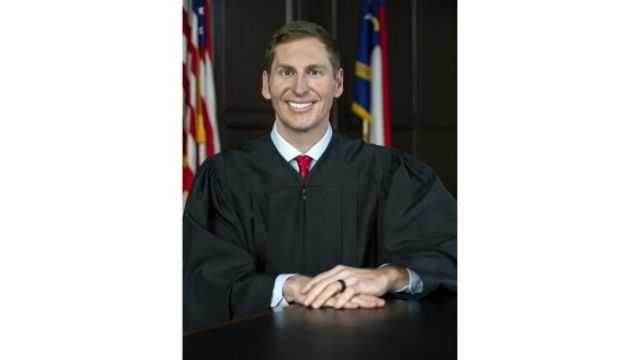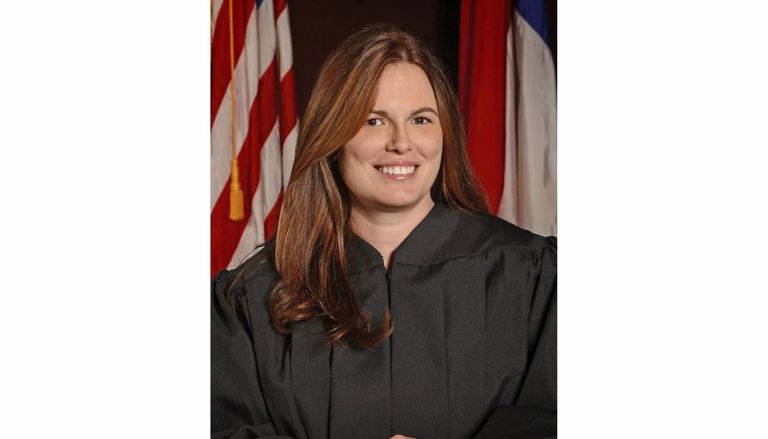RALEIGH, N.C. — An appeals court agreed Tuesday that a federal trial judge acted properly last month in declining to rule on the status of tens of thousands of voters last fall in an unresolved North Carolina Supreme Court election and returning the matter to state court.
The 4th U.S. Circuit Court of Appeals allowed Associate Justice Allison Riggs to return to federal court if she needs to make her case again. This could happen if state court appeals lead to Jefferson Griffin passing her in their very close election, especially if some ballots are removed from the count. The circuit judges’ order gives people a chance to argue that federal election and voting rights rules have been broken.
It seems that for now, federal courts will not be used to resolve the November election results between Democrat Riggs and Republican Griffin, who wanted to handle cases in state court. After two returns and more than 5.5 million ballots cast, Riggs is ahead of Griffin by 734 votes.
Griffin is questioning if about 66,000 votes should have been included in the count. Most of those votes came from people who didn’t have a driver’s license number or the last four digits of their Social Security number on their registration records. Others were cast by thousands of military or overseas voters who did not provide copies of photo identification with their votes and by hundreds of overseas voters who have never lived in the U.S.
In December, the State Board of Elections denied the official complaints made by Griffin, who is a state appeals judge. He wanted the votes to be removed, claiming they violated state law or the North Carolina Constitution.
The state Republican Party supports Griffin’s challenge and is happy that the 4th Circuit believes state courts should handle state elections, according to party spokesman Matt Mercer in a text message.
Riggs’ supporters, including important Democrats, have said that Griffin should give up. They charge Griffin and the state GOP of trying to change the election results by preventing people from voting, even though there’s no clear proof that these people are really not allowed to vote.
The election is one of the last races on November 5 that has not been decided yet.
Riggs is the “clear winner” and “people in North Carolina should know their votes matter,” but Tuesday’s decision “will delay things even more, wasting money that hardworking families pay in taxes,” said Ken Martin, the new chair of the Democratic National Committee, in a news release.
Since the election board took action, legal cases related to the election have moved through both state and federal courts.
Griffin’s lawyers first requested the state Supreme Court to step in and rule that the votes should not be included in the count. The elections board took the issue to federal court because they said Griffin’s pleas dealt with federal law. Four weeks ago, U.S. District Judge Richard Myers returned cases to state court because he chose not to make a decision. He mentioned that the cases involved unclear issues of state law. The board, Riggs, and others appealed to the 4th Circuit, which listened to oral arguments last week in Richmond, Virginia.
Myers had already brought the case back to state court. There, most of the state Supreme Court justices prevented the board from officially confirming the race while the court figured out what to do next. Riggs stepped away from those discussions.
Two weeks ago, the justices rejected Griffin’s request to remove the votes and said his ballot issues should be heard in a local trial court. A meeting is scheduled for Friday in Wake County.
On Tuesday, Judges Paul Niemeyer, Toby Heytens, and Marvin Quattlebaum Jr. decided that some appeals from Riggs and others were no longer relevant because of a decision made by the state Supreme Court. Even though they used a different legal argument than Myers, they agreed with his choice to stay out of the case due to unclear state law problems.
“The two sides have very different views on the North Carolina laws that Griffin is questioning,” the opinion stated. It also mentioned that resolving these state law problems might eliminate the need to deal with the federal constitutional and other federal matters involved. Any state appeals could go back to the state Supreme Court, where five out of the six judges handling the case are registered Republicans.

The opinion advised Myers to change his recent order to clearly keep control over the federal problems the elections board mentioned, in case those issues are still relevant after the state court cases, including any appeals, are resolved. This would let Riggs, who is involved in the case, ask a federal court to add any removed ballots back to the vote counts.
The eight-year term that is being voted on was set to start in early January. Riggs stays on the game for now.



Leave a Comment